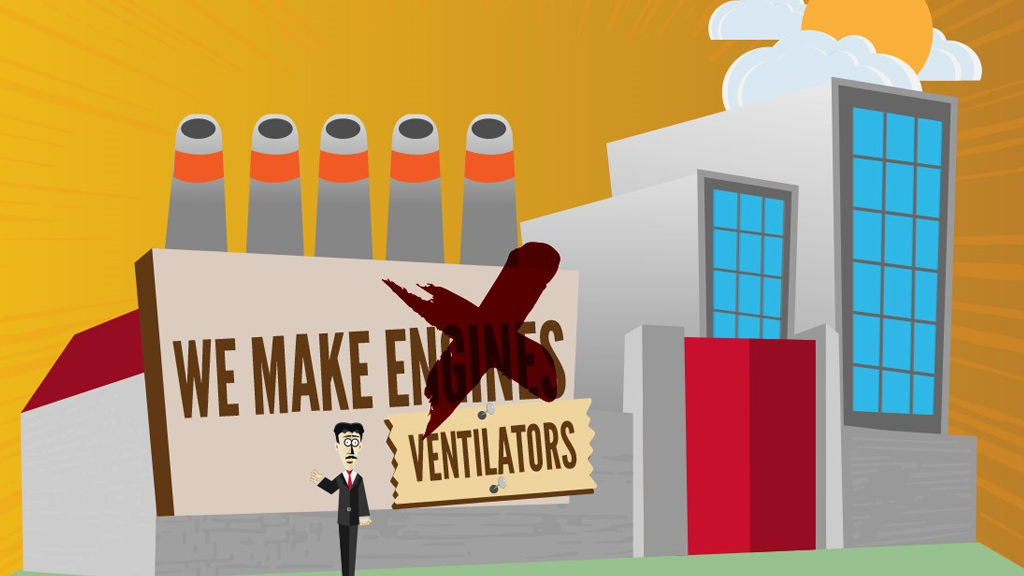Repurposing operations
Companies nationwide are repurposing operations to help America overcome the pandemic. Let’s take a look at why repurposing is important and how it helps an entire country.
Sometimes in sports, a new player will join the team. Sometimes that player is so good, we consider them a superstar. Someone that can do almost everything. They are immensely talented and probably is a household name. But what happens when the entire team gets worse because the ball is always going to that one superstar? Well, that’s when the coach has to make a decision. Usually, that decision is to convince the superstar to take a step back. To alter how he or she plays. That way, the rest of the team can benefit. The superstar now contributes as part of the team. Maybe he or she changed their game so that they are predominantly sharpshooters. Maybe they are primarily post up players now. Whatever the case, they pivoted their style to benefit the whole.
That’s precisely what some startups have done to contribute during the pandemic.
Sanitizing America’s hands
With many states experiencing a shortage of equipment and supplies, startups everywhere are pivoting operations to meet demand. A chocolate factory (not associated with Gene Wilder) in Waco, TX has pivoted to manufacture face shields. Before, their factory produced plastic packaging. In Dallas, you have a furniture company now making face masks. Tito’s Handmade Vodka in Austin and Gulf Coast Distillers in Houston’s East End are now manufacturing hand sanitizer.
“We have family all throughout Europe affected by COVID. We talked about what we could do to help here in our own state of Texas and so we decided that repurposing operations to produce hand sanitizer was in the best interest of everyone,” Carlos de Aldecoa, President and CEO of Gulf Coast Distillers, told Houston Public Media in an interview.
Further, Gulf Coast Distillers and Tito’s Handmade Vodka are using an FDA recommended formula. This formula makes the sanitizer more liquid-y that what one might be used to. It’s mostly alcohol and hydrogen peroxide.
“We have a capacity to make over 40,000 bottles of sanitizer every day plus our regular output of vodka and other spirits. Honestly, we’re mostly selling to end users like law enforcement officers, first responders, hospitals and people in oil and gas,” explained de Aldecoa.
The PPE pivot
Moreover, a medical startup called Lazarus 3D has completely pivoted to producing PPE during the pandemic. Before, Lazarus printed anatomically correct 3D models of organs for doctors to practice on before performing surgery.
“One day we just started receiving phone calls from distraught doctors and hospital administrators. They were telling us how underprepared they were to deal with the pandemic. They had no resources,” Lazarus 3D co-founder Jacques Zaneveld told Houston Public Media.
“So we decided to use our 3D printers to create prototypes of face-shields. We contacted our factories overseas to produce them en masse. Now, we make close to 45,000 face masks each day,” Zaneveld said.
Out in Seabrook, AK Wet Works, an industrial paint and coatings manufacturer joined the pivot game, too. They went from paint and coatings to manufacturing disinfectant applicators. AK Wet Works re-engineered their machines to meet EPA requirements for producing disinfectants. Each machine can disinfect around 25,000 square feet in an hour.
“Our company depends on the petrochemical industry. When they came to halt during the pandemic so did we. So we were just sitting on hands here. That’s when we decided that shifting our operations to fight the virus is way better than just continuing to sit and wait,” Michael Bland, Head of Local Business Development for AK Wet Works told Houston Public Media.
Repurposing operations is good for companies
According to Vikas Mittal, a marketing professor at Rice University, repurposing operations can be good in the long run. Pivoting operations during a national emergency can actually help companies long term. It can boost your brand and enhance your reputation. It can improve employee morale and expand your company’s notoriety.
“Taking the initiative to do something as altruistic as repurposing operations reinforces a company’s identity. It also allows a company to keep employees employed during a shutdown,” explained Mittal.
“More than that, companies might find that they are so good at the operations they pivoted to, they might actually add those operations to their line of work after the shutdown,” Mittal continued.



